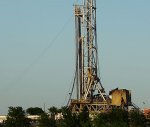Natural gas extraction in Australia using hydraulic fracturing, more commonly known as fracking, is generating increasing concern.
The issues to this point have been mostly related to the toxic chemicals used and impacts on landholders where wells are sunk, but a new study shows “fracking” for natural gas may be incredibly greenhouse gas emission intensive.
Fracking involves the use of sand and fluids being injected under high pressure deep into the ground to fracture rock, allowing trapped gas a way to escape and be collected.
The study from Cornell University states shale gas extracted through fracking will generate more greenhouse gas emissions in the next 20 years than the burning of coal.
While in Australia the target isn’t shale gas, coal seam gas (CSG) is the same – primarily methane. Methane has a shorter atmospheric lifespan than carbon dioxide, but in the first 20 years it has a GWP (Global Warming Potential) 62 times that of CO2. Methane also breaks down to water and carbon dioxide.
The study says 3.6% to 7.9% of the methane from fracking based shale-gas production escapes into the atmosphere in venting and leaks. These methane emissions are at least 30% more than and perhaps as much as twice as those from conventional gas obtained as a by-product of oil extraction and traditional capture from natural gas fields.
The higher emissions from shale gas happen when the hydraulic fracturing occurs as methane escapes from flow-back return fluids and during the drill out after the fracking.
Fracking has increasingly come under the spotlight in Australia. According to a report on the GasLand web site, Australian mining companies are using highly toxic chemicals to extract coal seam gas; including hydrochloric acid, and naphthalene- a substance once used in napalm. It’s believed some of these toxic chemicals can contaminate underground water supplies.
In Queensland, the gas rush is also causing headaches for landholders as the Petroleum and Gas Act overrides all private property rights.
The full Cornell study of methane gas emissions associated with fracking for shale gas can be viewed here (PDF)..
Image credit: David R. Tribble












































